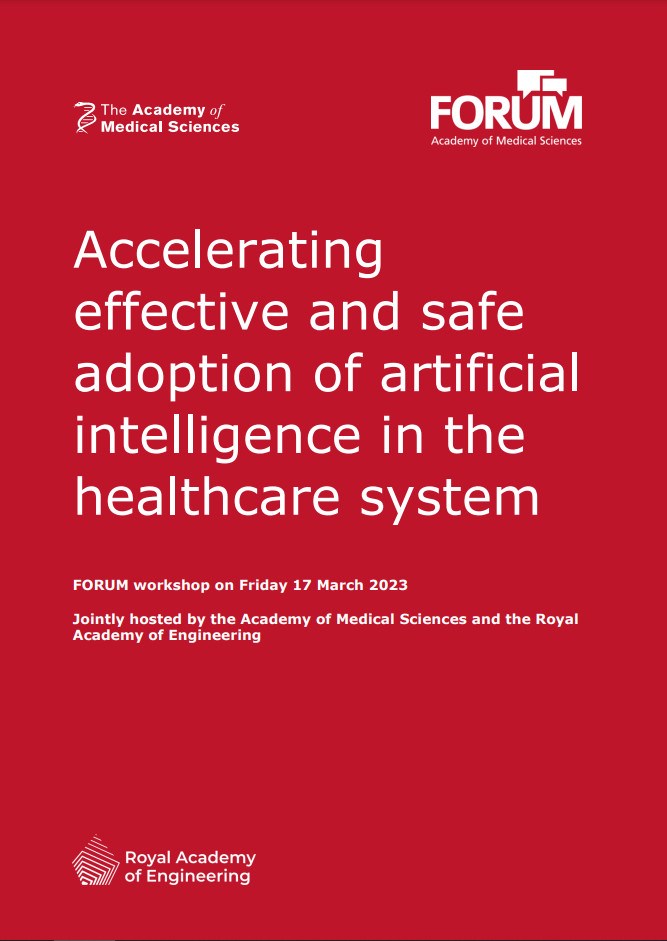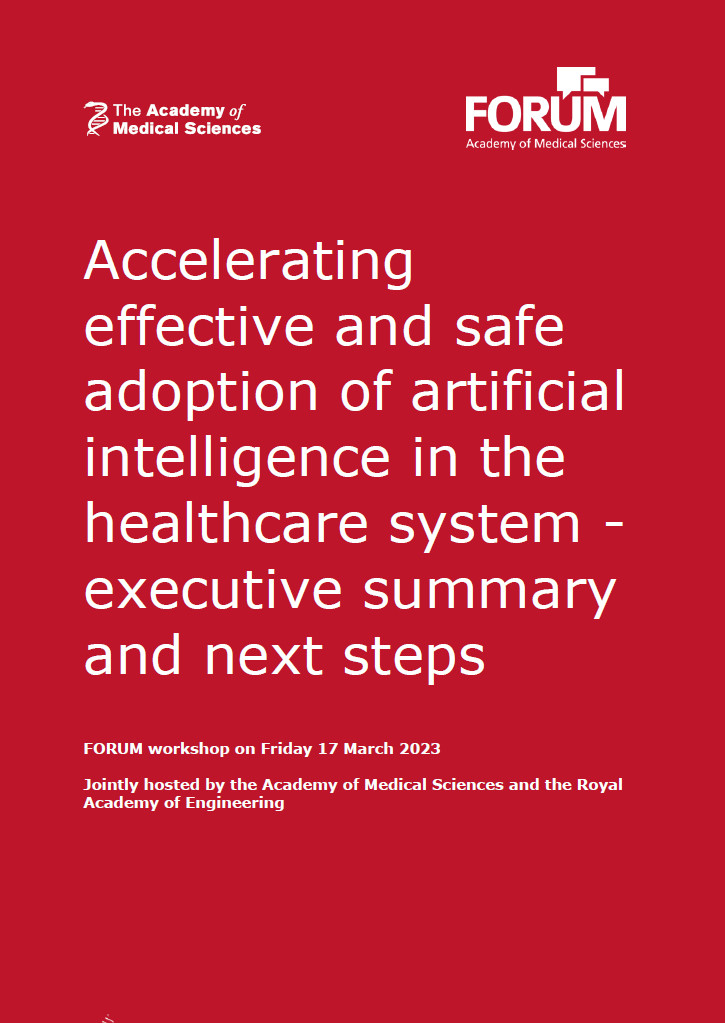Artificial intelligence-based healthcare technologies have great potential to transform health outcomes and the UK’s healthcare system. However, there are currently barriers to their adoption and scale-up. It’s time to learn from the technologies that have overcome these challenges and harness the full potential of AI in healthcare.
Our FORUM workshop in March, held in partnership with the Royal Academy of Engineering, looked at accelerating safe and effective adoption of artificial intelligence in the healthcare system. We brought together representatives from academia, industry and the health and social care sectors, along with patients and regulators. They discussed what lessons can be learnt from the AI technologies already in use in healthcare.
One AI technology currently being piloted, which has the potential to benefit patient health, reduce inequalities and save precious time and money for the healthcare system, is DM Schedules. It picks out patients at high risk of missing hospital appointments and sends them tailored reminders and support. Hospital appointments are often missed due to inequalities, such as a single parent struggling to find childcare, and they are associated with worse health outcomes as well as costing the NHS £1.2 billion a year.
Here are the workshop participants’ views on what can be done to address the main barriers to adoption of AI in the UK healthcare system.
- A confidence boost: better communication and involvement
Some doctors, nurses, patients and the public lack confidence in the way AI is used in healthcare. This may be due to a lack of time or incentive, concerns about health data privacy, and/or not enough awareness of the limitations of the current standard of care and how this could be improved by AI.
All those who make, use and benefit from AI technologies should be involved in their development from early on. This includes patients and the public who provide their data, the IT teams who install the technology, and doctors and other healthcare professionals who use it. These groups should also have a say in how to best communicate transparent and clear information about the technologies.
Dr Dan Mullarkey, Medical Director, Skin Analytics and NHS General Practitioner, was a participant at the workshop:
“My company has created DERM, an AI technology that screens for skin cancers. Since 2020, DERM has found over 2,200 skin cancers and helped to avoid over 22,000 unnecessary face-to-face appointments. However, getting it into the system was not easy. Wider promotion of the benefits of AI is needed to ignite people’s interest in investing time in AI-based healthcare technologies.”
- A tech-ready NHS: improved digital infrastructure
Many healthcare settings still use paper notes and lack basic digital systems such as computers with up-to-date operating systems. The digital systems that do exist in NHS trusts and other healthcare bodies are often incompatible with one another, limiting the ability to transfer data and scale-up AI technologies. Digital infrastructure in the healthcare system should be improved and standardised so that systems can speak to one another.
Data collection from patients should ensure that datasets, which are used to train AI-based technologies, are diverse and representative of the whole population, to avoid introducing inequalities. Standards should be developed for data collection and use, which will also help with public trust about how health data is used.
- Effective regulation: suitable evaluation of AI
When it comes to assessing effectiveness and value for money, AI-based technologies have specific challenges that regulators need to account for. Some AI-based technologies continue to learn and evolve once in use, based on the data they process, so their performance could change over time. In addition, AI technologies often have multiple positive impacts. A technology designed to improve the accuracy of patient referrals from a GP will also benefit staff time at the specialist clinic they are being referred to. This makes assessing their true economic value, and who should pay for the technology, complex.
A system for monitoring, evaluating and updating the technology after adoption is essential, as is assessing the effects across the whole system. Use of the new AI and Digital Regulations Service, which provides guidance on regulations and how to evaluate the effectiveness of these technologies, is encouraged for developers and NHS and social care staff using AI.
- Coordination: calling for strategic direction
For AI to revolutionise healthcare, strategic direction at a national level is needed to encourage coordination across the currently fragmented healthcare system.
Professor Jackie Hunter CBE FMedSci, Board Chair of Brainomix Ltd and Biocortex, and Co-Chair of the workshop, said:
“We are only just beginning to realise the vast benefits AI can offer to our struggling healthcare system and the patients who rely on it. To enable AI to reach its full potential to improve efficiency, effectiveness and the health of the public, the solutions summarised in this workshop report are an important starting point.”
Professor Lionel Tarassenko CBE FREng FMedSci, Professor of Electrical Engineering, University of Oxford, and Co-Chair of the workshop, said:
“AI has the potential to make healthcare more inclusive, if implemented and managed safely and effectively. There are many possible use cases where AI could help to improve the healthcare system, including for scenarios such as identifying those likely to miss their appointments and using generative AI with Electronic Health Records to spot early signs of undiagnosed disease, including cancer. The workshop highlighted the importance of strategic direction, thorough monitoring and evaluation, and of clear communication when adopting new technologies to increase public confidence about changes that may affect many of us. We hope that this workshop report will assist efforts to coordinate strategic direction and regulation of AI applied to healthcare, where the UK has several advantages, including NHS data and world-leading research groups and companies.”
The ‘Accelerating effective and safe adoption of artificial intelligence in the healthcare system: learning by doing’ workshop was held on Friday 17 March 2023. It was convened as part of the Academy’s FORUM programme, which was established in 2003 to recognise the role of industry in medical research and to catalyse connections across industry, academia and the NHS.
If you would like information on the benefits of becoming a FORUM member, please contact [email protected].
This article was covered in Electronic Specifier.

